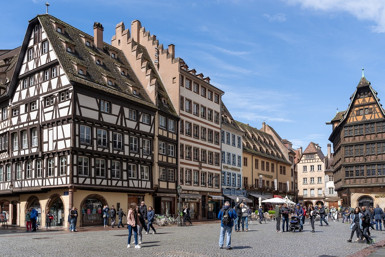French Nouns

In this lesson you'll learn how to use nouns in French, You'll also learn some more basic French phrases.
A short conversation in French is also included to help you learn how to speak conversational French.
Flashcards are included at the end of the lesson to help you learn the French phrases and words.
French Pronunciation
Pronunciation of the French language is fairly difficult. Listening to the pronunciation of the phrases in the lessons is the best way to learn. Here are a few things to remember.
The letter y is pronounced like the ee in meet.
The letter é is pronounced like the ay in day, but a bit shorter.
The letter u is pronound like the w in English when it is followed by another vowel. When it is followed by a consonant, it has a sound that is not in English. It sounds somewhat like the oo in moon, but with the lips tightly rounded.
The letter combinations au and eau are pronounced like the o in note.
The letter combinations eu œu represent sounds that are not in English, but they are similar to the sound of the i in dirt when followed by a pronounced consonant, otherwise like the u in put.
Advertisement
French Conversations
Read and listen to the following conversation between Charles, Léo, and Sylvie. Note that Léo and Sylvie use the polite version of you, since they have just met. Some people will use the informal version of you even if they have just met. To be safe you should use the polite version of you when talking to people you have just met.

French
Charles et Sylvie se rendent à pied dans un restaurant pour le déjeuner. Sur le chemin, ils aperçoivent Gabriel, l’ami de Charles.
Charles: Salut Gabriel. Comment ça va?
Gabriel: Bien.
Charles: C'est Sylvie. Elle est de Lyon.
Gabriel: Enchanté de vous rencontrer, Sylvie.
Sylvie: Enchanté de vous rencontrer également. Vous avez faim? Nous allons déjeuner.
Gabriel: J'ai faim, mais je dois retourner au travail. Je vous verrai peut-être plus tard.
Sylvie: Au revoir.
Charles: Allons-y. Léo est déjà là.
English
Charles and Sylvie are walking to a restaurant for lunch. On the way they see Charles's friend Gabriel.
Charles: Hi Gabriel. How's it going?
Gabriel: Good.
Charles: This is Sylvie. She is from Lyon.
Gabriel: Nice to meet you Sylvie.
Sylvie: Nice to meet you too. Are you hungry? We're going for lunch.
Gabriel: I'm hungry, but I have to go back to work. Maybe I'll see you later.
Hannah: Bye.
Stefan: Let's go. Léo is already there.
Nouns
Nouns are words that name people, places, things, or ideas. In French, all nouns have a gender: masculine or feminine. To form the plural of most nouns, add an s to the end of the word. Most words that end in al, form the plural by changing the al to aux. Words that end in eu or au form the plural by adding x to the end of the word. Singular nouns that end in s, x, or z do not change for the plural form.
The s or x in the plural form of French nouns is usually silent, but they can be pronounced as a /z/ sound when the following word is an adjective that starts with a vowel.
Articles
Articles are words that come before nouns to indicate their gender, number, and specificity. There are three types of articles in French: definite, indefinite, and partitive. French nouns will almost always be preceded by one of the three types of articles.
Definite Article
Definite articles are used to refer to specific or known nouns. They are equivalent to the English word "the". The definite articles in French are: le for singular masculine nouns, la for singular feminine nouns, and les for masculine and feminine nouns. Le and la are shortened to l' before nouns that start with a vowel. Definite articles are used more often in French than in English.
Example
| Le chat est noir. | The cat is black. |
| La voiture est rouge. | The car is red. |
| L'oiseau chante. | The bird sings. |
| Les enfants jouent. | The children play. |
Indefinite Article
Indefinite articles are used to refer to nonspecific or unknown nouns. They are equivalent to the English words "a" and "an". The indefinite articles in French are:
- un for masculine singular nouns
- une for feminine singular nouns
Examples
| Un chien court. | A dog runs. |
| Une pomme est verte. | An apple is green. |
Partitive articles
Partitive articles are used to refer to a portion or quantity of a noun. They are equivalent to the English words "some" or "any". The partitive articles in French are:
- du for singular masculine nouns
- de la for feminine sigular feminine nouns, which is shortened to de l' when the following noun starts with a vowel
- des for masculine and feminine nouns
Examples
| Je mange du pain. | I eat some bread. |
| Elle boit de la limonade. | She drinks some lemonade. |
| Il achète de l'eau. | He buys some water. |
| Nous avons des amis. | We have some friends. |
| Des livres sont sur la table. | Some books are on the table. |
French Vocabulary
Here are some very common French words, along with its corresponding definite article.
| French | English |
|---|---|
 la personne
la personne
|
the person |
 l'homme
l'homme
|
the man |
 la femme
la femme
|
the woman, the wife |
 la fille
la fille
|
the girl |
 le garçon
le garçon
|
the boy |
 le corps
le corps
|
the body |
 la tête
la tête
|
the head |
 la face
la face
|
the face |
 les dents
les dents
|
the teeth |
 les mains
les mains
|
the hands |
 le chat
le chat
|
the cat |
 le chien
le chien
|
the dog |
 les étoiles
les étoiles
|
the stars |
 la rue
la rue
|
the street |
 le pont
le pont
|
the bridge |




Flashcards
Here are some flashcards to help you learn the French phrases for greetings and the numbers from one to ten.